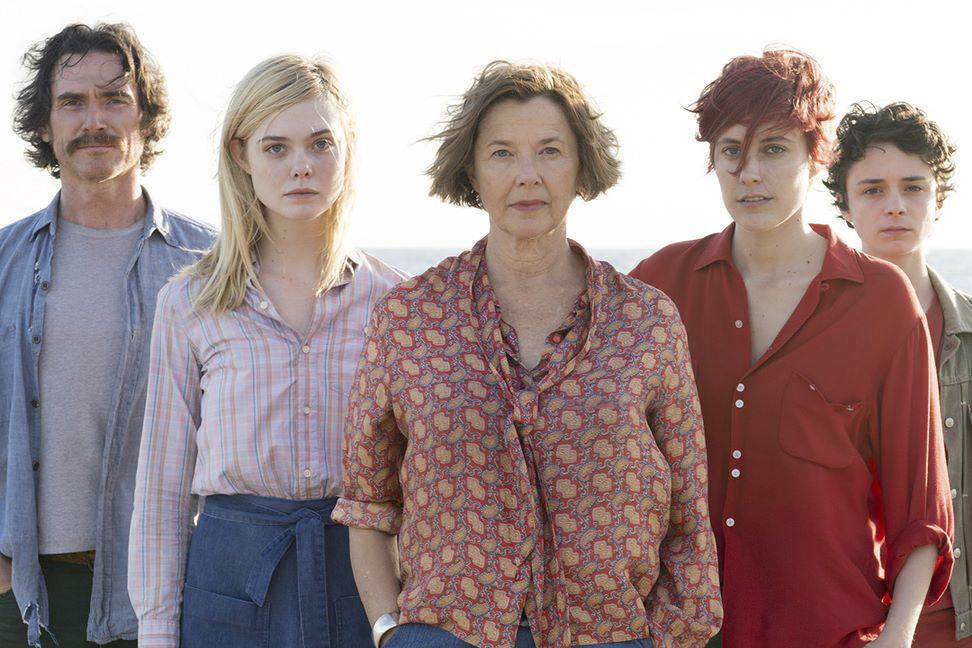There’s a talking dog in Beginners, the 2010 movie that won Christopher Plummer a supporting-actor Oscar. To be precise, the dog speaks in subtitles, which might make the premise easier, or possibly harder, to take. As a general rule I am not opposed to talking-canine scenarios; for instance, the title pet of the cult picture A Boy and His Dog makes a strong argument for the idea. But in Beginners, it was one thing too many in a film that already pushed the boundaries of cuteness.
Its writer/director, Mike Mills, returns with 20th Century Women, a movie with an attractive premise and cast. It’s set in 1979—a cool time to be young, despite what you may have heard—and it puts three distinctive actresses at the forefront of a coming-of-age story. The person coming of age is Jamie (Lucas Jade Zumann), who lives with his mother Dorothea (Annette Bening) in a big old house in Santa Barbara. Dorothea rents rooms to William (Billy Crudup), a handyman shaped by the ’60s, and Abbie (Greta Gerwig), a free spirit recovering from cancer. Although Dorothea seems in every way a Right-On Movie Mom, she decides she’s not life-lessoning Jamie enough, so she enlists her boarders, along with Jamie’s platonic pal Julie (Elle Fanning), to help mentor him.
Mills keeps the pace sprightly with a variety of devices. News footage pops up regularly, and there’s narration from various characters. The soundtrack is a mix of hip songs from the era and New Age soup. We are reminded that this is all memory, as Dorothea’s own narration informs us that she will later die of cancer caused by smoking cigarettes. It is, without doubt, a smart film, with its fair share of amusing situations. The reviews have generally been good, and Oscar talk is afoot. I found it to be, by and large, baloney.
The grandiosity of the title and the film’s reaches for significance (the Jimmy Carter “Crisis of Confidence” speech anchors a key sequence) suggest its tendency to try too hard. And despite the nice opportunities given to three deft actresses, the depiction of these 20th-century women feels like a boy’s projection of the ideal women for his teenage life. I also had the bad luck to see 20th Century Women a few days after seeing Kenneth Lonergan’s Manchester by the Sea, and the difference in dialogue-writing is revealing. Lonergan is a master of writing speech that reveals a lot without always mentioning its true subject. Mills has a nice ear for half-sentences (Bening is especially good at nailing these), but too often the dialogue states exactly what it means, as though the characters had been reading self-help books. (I know, I know, it was the ’70s.)
As expert as she is, Bening’s role doesn’t give her real range; compare it to The Kids Are All Right, and you’ll see how much less room she has to play with. Gerwig continues to find new ways to make conversation sound fresh, and Crudup—an actor who always seems to crave the sidelines—is exactly right. When William is explaining to Abbie why he likes working with his hands (it makes him closer to Mother Earth, etc.), Crudup makes you understand that William isn’t saying these things in order to sleep with Abbie—he actually believes it. William also makes his own shampoo. “Of course you do,” sighs Abbie.
There are things to enjoy in this film, and I am of course grateful for the absence of talking dogs. But when you don’t buy into a movie, even the skillfully turned witticisms float there as isolated one-liners instead of insights in a larger, connected tapestry. 20th Century Women wants to be outside the norm, wants to celebrate the bohemian spirit of its characters. Maybe that’s why, compared to recent coming-of-age sagas such as Diary of a Teenage Girl or American Honey, its neatness feels a little smug. 20th Century Women, Rated R. Opens Fri., Jan. 20 at various theaters.
film@seattleweekly.com






